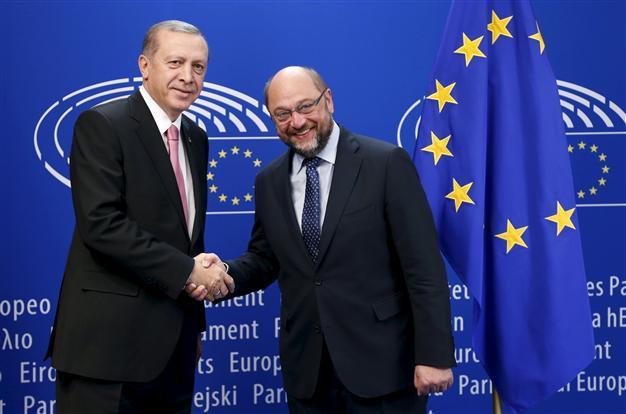EU seeks to accelerate Turkey’s stalled accession process
Serkan Demirtaş - ANKARA

Turkey's President Tayyip Erdoğan (L) poses with European Parliament President Martin Schulz ahead of a meeting at the EU Parliament in Brussels, Belgium October 5, 2015. Reuters Photo
The European Union is seeking to accelerate Turkey’s almost stalled accession negotiation process by annexing a set of priorities and concrete recommendations to its soon-to-be released progress report, seen as a short-term road map for the next government to be formed after Nov. 1 elections.These concrete recommendations cover an implementation period of 12 to 18 months so that more negotiation chapters can be opened as part of Turkey’s accession process, started in 2005. Turkey opened only 14 chapters out of 35 and closed only one of them. Croatia, which began negotiations on the same day as Turkey, joined the EU in mid-2013.
As the EU is preparing to release its annual report on Oct. 21 or Oct. 22 in which it will assess the state of human rights and fundamental freedoms within the last 12 months period, it will, for the first time, annex a document to outline its recommendations to Turkey’s next government. This year’s report is expected to be made of three main parts.
The first part will assess the state of Turkey’s accession process, as a sort of picture of the point Turkey has reached so far. This picture will also be important in regards of shaping Turkey’s next actions.
The second part will assess Turkey’s last 12 months in terms of its performance on negotiation chapters as well as its human rights and democratization process. It’s expected the report will highlight overall human rights violations as Turkey’s number one issue as well as restrictions on freedom of expression, freedom of press and the Kurdish peace process. The EU’s criticisms on the home security package and internet laws would also be detailed in this part.
The third part, however, will contain concrete recommendations for the acceleration of the accession process, enabling Turkey to fulfill more criteria to open negotiation chapters. This set of priorities is envisaged to cover a period of 12 to 18 months, which would be regarded as a short-term road map for Turkey’s next government after the Nov. 1 polls.
A more political report
According to diplomatic sources, this year’s report is being written in a more political language compared to last years’ technical format and therefore, will be more interesting and even exciting. Using this language, the 2015 report will supposedly address Turkey’s growing human rights deficiencies in a more direct way, sending a clear message to the next government.
The reason for the postponement of the progress report’s announcement by one week was because the EU wanted to have better coverage and reflection on its findings, as the original date of the release of the document coincides with the EU Council meeting on Oct. 13, sources stressed.
In the meantime, sources expressed their expectation for the opening of chapter 17 on economy and monetary policies most likely before the end of this year. But it’s too early to confirm this, sources said. President Recep Tayyip Erdoğan has expressed Turkey’s expectations for the opening of chapters 23 on judiciary and fundamental rights, 24 on justice and home affairs and 15 on energy.
Momentum in ties
According to sources, a growing number of issues to the concern of Turkey and the EU have the potential to create a new momentum in Ankara-Brussels relations, as well as Turkey’s accessions process. Turkey and the EU are currently talking about ways to cooperate in dealing with the refugee crisis, security problems concerning Syria, counter-terrorism and energy. Describing Turkey as a partner of the EU in dealing with these common problems, sources highlighted the EU’s willingness to establish solid mutual ground with Turkey in countering refugee issues.
The draft plan on dealing with the refugee crisis to be negotiated between two parties will also help Turkey’s efforts to fulfill the required criteria of securing its borders as part of visa liberalization process with the EU. Turkey hopes to accomplish the process by 2017 and allow its citizens to travel in the Schengen area without visas.
















